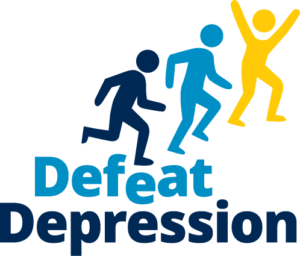The annual Defeat Depression initiative, created in partnership with Mood Disorders Society of Canada, raises funds in support of people suffering with poor mental health. The 30-day challenge is in the form of an online interactive workshop; each day, participants choose from a variety of activities designed to reduce stress and depression.
Victoria Defeat Depression chair Melissa Wallace wants people to understand that mental illness is not a rare, closeted disease that only affects a few people. She posits that everyone will at some point in their lives need help maintaining a healthy emotional and cognitive mindspace.
“I don’t think many people realize that, because you always hear the statistic saying one in five of us have mental health issues,” says Wallace. “We need to start to normalize mental health, plain and simple, because it is just as strong of an impact as an actual illness, including, unfortunately, persons who take their lives because of it.”
Wallace says that a significant proportion of Canadians avoid seeking help for mental health issues, because they fear they will appear as weak or abnormal to other people, but this is in fact a very common struggle.
“They’re definitely not alone. We want to make sure people know that we’re here for them, and we’re a part of the community, and we’re also members of that community, too,” she says. “And we’ve all gone through lived experience, if not currently living through that experience of severe depression, or whatever it is. We’re always there, so never ever be ashamed.”
Wallace says that it’s easy for people to get involved in the initiative and get active.
“What people do is they register on the Defeat Depression website, they sign up and it’s a $25 charge, and for that they receive a T-shirt and a number of other items in a swag bag,” she says. “Then we send them out an email each week with 10 different wellness activities, so that way if a person doesn’t feel like doing one task there’s 10 of them; they can easily choose whatever resonates the most with them.”
She says that some of the activities focus on physical exercise, while others are more fun, or are intended to find a sense of calm, and will cover a wide range of strategies for overcoming depression.
“Some of them are just to make sure that you’re in the present, like walking along the beach—that always seems to help to ground a lot of people,” she says. “It’s just those kinds of activities to hopefully liven things up, and simply to have a little bit of fun, and a bit of a change of pace, and at the same time raise funds for Mental Health Recovery Partners.”
Wallace encourages people to share their involvement on social media in order to spread the word about the event. However, people who don’t want to be directly involved in the 30-day challenge can still donate the traditional way, through the website.
“We’re hoping everybody feels it’s a win-win,” she says. “Not only are they helping a local non-profit with their mental-health supports and changing people’s lives, but they’re also hopefully recognizing that they can reawaken, like the rest of us are trying to find a way do with COVID.”
Wallace encourages discourse around mental-health experiences as a way to bring the discussion out into public awareness. She feels that the more a society addresses an uncomfortable issue, the easier it becomes to create change for the better.
“This is a much bigger conversation, and for some reason people just don’t feel comfortable talking about it,” she says. “But it would just be fantastic to start really opening up and having those conversations with everybody so we can start changing the culture.”
Find out more about Defeat Depression at victoria.defeatdepression.ca.

